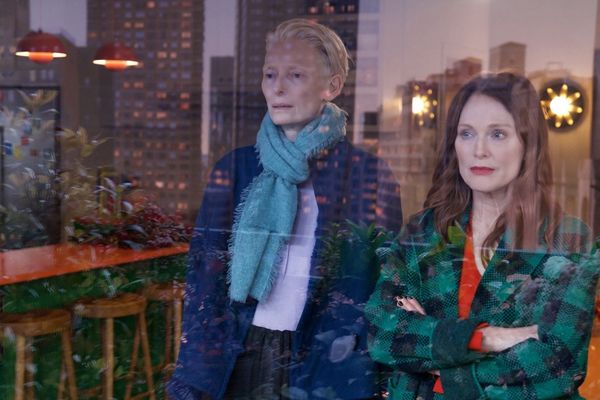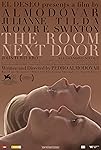Eye For Film >> Movies >> The Room Next Door (2024) Film Review
The Room Next Door
Reviewed by: Anne-Katrin Titze

Pedro Almodóvar’s free and fabulous adaptation of the novel What Are You Going Through by Sigrid Nunez is his first feature in English and a celebration of life’s miraculousness face-to-face with death. The duo of Julianne Moore and Tilda Swinton display an inner and outer beauty that lifts a tale of dying into an unforeseen realm, where friendship and care and appreciation of the world reign.
At a book signing, author Ingrid (Moore) learns from an acquaintance that her old friend Martha (Swinton), a war correspondent, is seriously ill in the hospital. Soon the two of them bond as if the time that passed since they last saw each other didn’t exist. Their exquisite faces fill the screen (cinematography by Eduard Grau) and the, as always in Almodóvar’s films, vibrant garments (costume design by Bina Daigeler) and eye-catching sets (by Inbal Weinberg with art direction by Gabriel Liste) paint a mood that feels more launch than coda. The vase with snapdragons and the outrageously fantastic view of the Manhattan skyline from the window of this to-die-for hospital room make you forget that death is present. Maybe though, because of this spectre, the vividness becomes even more overwhelming.

Martha speaks about her estranged daughter, who from the start made the mother question if she wasn’t perhaps swapped at birth. She had her as a teenager and remembers the New York of the Eighties where “everything important happened at night” and she never felt that she was what a mother was supposed to be. Almodóvar includes a flashback to young Martha meeting Fred, the absent father-to-be, who will return from Vietnam like a “broken toy.” Strawberry and chocolate milkshakes at a diner, a red car, a house on fire, a grieving widow - the filmmaker sketches out a lost life in brief, stark, momentous moments that illustrate resentments of a daughter, as told by her dying mother to a friend of the past.
Flowers and lots of fruit take up residence in various scenes, a reminder of the delights in the already plucked. The clothing - fabulous sweaters, an elegant trench coat here and a perfect woven leather tote there, a pungent green plaid jacket and a key lime-yellow suit - that the women wear for each other, speaks of their growing complicity. Unlike The Friend, also an adaptation of a novel by Sigrid Nunez, in which directors David Siegel and Scott McGehee put Naomi Watts in scruffier cardigans and pattern-clashing fabrics, Almodóvar goes all out with the delights fashion has to offer, bright colours, the joy of transformation - because it is never too late for sartorial metamorphosis.
Martha’s apartment we get to see when she leaves the hospital, is not only unmistakably a Pedro creation, but also reminiscent of all the wonderful movie penthouses Hollywood conjured up, for instance in Jean Negulesco’s How To Marry A Millionaire, or Dean Martin’s New York bachelor pad in Vincente Minnelli’s Bells Are Ringing. Realism is not the point here, but the healing power of cinematic dreams.
Ingrid tells Martha that she is planning a book on Dora Carrington, the painter affiliated with the Bloomsbury Group, who committed suicide two months after her friend Lytton Stacey’s death. Another flashback to Martha’s experiences in Baghdad during the Iraq war provokes an exchange about the nature of fiction and love in war times. The conversation between the two women continues in the tiny Jefferson Market community garden, as they reminisce about their “shared lover” Damien (John Turturro).
Pink snowflakes bring to mind not only the marks of climate change, but the end of James Joyce’s The Dead, which will return two more times in variant form in the movie. Martha knows it by heart: "His soul swooned slowly, as he heard the snow falling faintly through the universe, and faintly falling, like the descent of their last end, upon all the living and the dead.”
The Room Next Door (Golden Lion winner at the Venice International Film Festival and the Centerpiece Gala selection highlight of the 62nd New York Film Festival) is packed not only with spectacular shots of nature and the city, humans und human-made things, it weaves in the power of other works of art organically and meticulously. The friends’ most consequential meeting takes place in the lobby of Alice Tully Hall at Lincoln Center, where the New York Film Festival takes place, and the movie had its US première (Almodóvar joked at the press conference how disappointed he would have been had it not been selected). The two are there to see Roberto Rossellini’s Journey To Italy and Martha suggests a voyage for them to Upstate New York.
Another dream-like location where glass walls make inside and outside merge and an Edward Hopper painting (“looks real or a very good copy”) invites visitors to double the vista on the balcony is the house Martha chooses. One shot shows Ingrid as though she were sitting outside in the middle of the forest writing at her desk in the dark of night. A very real ghostliness emerges, as when during a quick and urgent return to the city we may notice for the first time all the evil-eye artworks on Martha’s walls and a copy of Don DeLillo’s Mao II that draws the eye to the bookshelf. A returning “like after I’m dead” makes for a jolting visitation that cinema revels in.
Back upstate in a bookstore, Ingrid, upon spotting a Martha Gellhorn book, asks “Which war is yours?” “Bosnia without a doubt” is Ingrid’s response. Under her arm she carries a book with the title “How to look at a Bird.” Reading Faulkner and Hemingway and listening to music has become impossible, but birdsong still works. And movies. The two watch Buster Keaton. Cosy on the couch, Martha is cuddled up in a gigantic knit sweater (Tilda’s own, Sigrid Nunez told me) ready to move on to Max Ophüls’s wonderful Letter from an Unknown Woman and a glimpse of John Huston’s The Dead, quoted earlier.
Damien, who meets Ingrid for a lunch of fruit (once more!), becomes the mouthpiece for all that is wrong with our world. Turturro in a diatribe regurgitates it with gusto - from the rise of the far-right to the end of the planet, he says he completely lost faith. But Ingrid knows that “there are lots of ways to live inside tragedy.” He compliments her as being one of the rare people who “know how to suffer without making others feel guilty about it.”
Alessandro Nivola, playing a policeman in a poignant and intense scene of interrogation, is fantastic as an agent of disenchantment who shifts the perspectives between an outside law-and-order world and an inside were lies and truth stir differently. It is not the first time that an Almodóvar film tricked me into believing I saw a ghost, which ultimately turns out to be very much flesh and blood. A third variation on Joyce and Huston takes both, and adds some Nunez and Moore and Swinton and Almodóvar and many a birdsong, because the snow unites us all falling faintly through the universe “upon all the living and the dead.”
Pedro Almodóvar knows how to utilise the charms of a fairy tale to speak about the most urgent concerns in a way that is still comforting. His films and this one in particular embrace the possibility of change. You may be terribly afraid of death or feel incapable to endure loneliness, he shows, but there is a glorious sunset over the skyline, a movie that takes your breath away because it guessed your secret thoughts, a lipstick the colour of the ripest berry, and a friend you didn’t know you had.
The Room Next Door will have its UK première at the London Film Festival on Saturday, October 19.
The Room Next Door opens in the UK on Friday, October 25 and in the US on Friday, December 20.
Reviewed on: 11 Oct 2024















